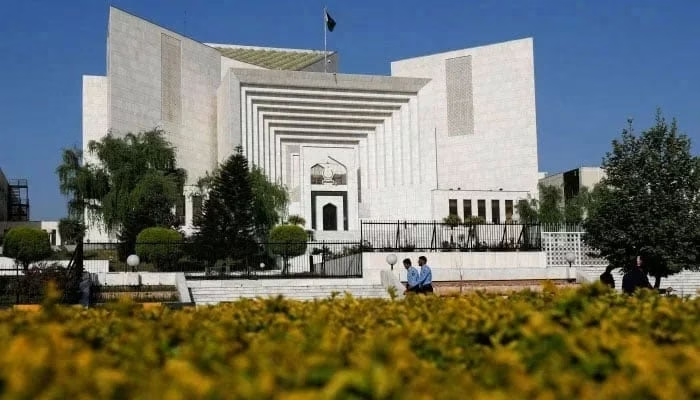The Supreme Court of Pakistan’s constitutional bench has taken a significant step in reviewing the trials of civilians in military courts. This issue has drawn widespread attention, raising questions about the fairness and transparency of such trials. During the hearing, the court emphasized its intent to examine the evidence and procedures used in military court trials to ensure they meet the standards of natural justice.
Constitutional Bench’s Inquiry
A constitutional bench headed by Justice Aminuddin, with Justices Hassan Rizvi and Muhammad Ali Mazhar, presided over the intracourt appeal challenging the decision to try civilians in military courts. The Defense Ministry’s lawyer, Khawaja Haris, presented the ministry’s arguments.
Justice Hassan Rizvi reiterated the court’s request for records of military trial cases, stating that the bench aims to review how evidence was decided during these trials. The defense ministry’s lawyer responded by agreeing to present the records of one case for the court’s review.
Focus on Fair Trial Standards
Justice Muhammad Ali Mazhar underscored the importance of ensuring that military court procedures align with the principles of a fair trial. He stated that the court’s primary focus is to assess whether the trial process adheres to natural justice.
The defense ministry’s lawyer assured the court that military trials follow established procedures but argued that the merits of the cases are beyond the purview of review by the high courts or the Supreme Court.
Justice Hassan Rizvi clarified that the court’s interest lies in reviewing the evidence and procedures, not in debating the evidence itself. He emphasized that no one can be sentenced without being heard, a fundamental tenet of natural justice.
Discussion on Section 2(1) D1
During the proceedings, the validity of Section 2(1) D1 of the relevant law was discussed. The defense counsel argued that if this section is deemed valid, the applications challenging the trials of civilians in military courts would become inadmissible.
The court noted that this matter would require detailed deliberation, as it has significant implications for the legal framework governing military court trials.
Arguments on Fundamental Rights
Khawaja Haris maintained that the Supreme Court cannot review military court sentences on the basis of fundamental rights. This argument was met with queries from the bench about the balance between national security considerations and individual rights, highlighting the complexity of the issue.
Adjournment and Next Steps
The hearing was adjourned until the following day, with the court directing the Defense Ministry’s lawyer to conclude his arguments in the next session. The bench’s decision to adjourn reflects the intricate nature of the case and the need for comprehensive legal arguments before reaching a verdict.
Broader Implications
The review of civilian trials in military courts is a pivotal legal and constitutional matter in Pakistan. Critics of military court trials argue that they lack transparency and fail to provide the accused with adequate safeguards. Proponents, on the other hand, emphasize the need for such courts to address issues of national security effectively.
The Supreme Court’s decision to review the evidence and procedures of military court trials marks a critical step toward ensuring that justice is served while maintaining the balance between individual rights and state security.
The ongoing Supreme Court proceedings on the trials of civilians in military courts underscore the judiciary’s role in upholding the principles of justice and fairness. As the case unfolds, it is expected to set a precedent for the treatment of similar cases in the future.
The court’s focus on procedural fairness and adherence to natural justice highlights its commitment to ensuring that the rule of law prevails, even in cases involving national security. The next hearing is eagerly anticipated, as it will likely shed further light on the intersection of legal standards and military court practices.



